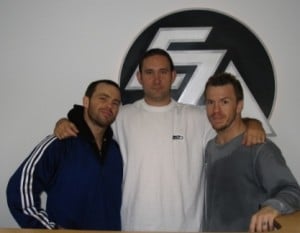by Garrett Chin
The Secret of Socrates
Back in 2004, it was the year an important lesson was learned as a clinician. I was on my first clinical rotation as an undergraduate student at Simmons College (Boston, MA). Before I go any further, Simmons’ is a female only college, which can be more difficult for an opposite sex clinician if you do not gain the trust immediately. Long story short, as an inexperienced clinician at the time, I have instructed an athlete with toe contusions to use the cold whirlpool. The athlete responded, “No” because she didn’t want to get wet and preferred an ice bag. Now as a clinician, there are certainly better methods of cryotherapy than the other pending on the area. While taking modalities class that same semester, it was all I knew as an extremely young clinician. Since this was all I knew, I was the “expert” on cryotherapy already and in this case the toes were an irregular area and using ice water would have made more contact area than the ice bag. (We can save the topic of “cryotherapy” for another time). I kept insisting that the athlete used the cold whirlpool, and each time the athlete refused even more.
The method of cryotherapy wasn’t the issue that had bothered me, but it was the “No” that I felt rejected. A ‘No’ response, according to Professor Overstreet1, is a most difficult handicap to overcome. When a person has said “No,” all their pride of personality demands that they remain consistent with themselves. However, they may later feel that the “No” was ill-advised; nevertheless, there is their precious pride to consider! Once having said a thing, majority of the time, a person feel they must stick to it. In this particular case, the athlete said “No” and she was sticking to it.
Regardless of the relationship (coworkers, family, friends, etc.) this is a principle that applies to all: In talking with people, don’t begin by discussing the things on which you differ. Begin by emphasizing, and most certainly keep on emphasizing the things on which you agree. Keep emphasizing, if possible, that you are both striving for the same end and that your only difference is one of method and not of purpose. Get the other person to say, “Yes, yes” at the outset. Keep your opponent, if possible, from saying “No”.
In this particular case, before I began studying human relations, I refused the patient my service if she refused to follow my treatment plan. I must admit that as an inexperienced clinician, I am ashamed that I have been guilty of doing that very thing in the past. Naturally, an ultimatum like this made me feel good since it gave me a sense of power and that my specific treatment procedure couldn’t be disregarded. But this sort of attitude certainly didn’t give a feeling of welcome and importance to the female athlete, whom the reason why I have a job in the first place.
Socrates was one of the world’s greatest philosophers. He did something that only a handful of people throughout history have been able to do, and that is to change the whole course of human thought. Centuries after his death, he is honored as one of the wisest persuaders ever to have graced this planet. His Method? Did he tell people they were wrong?
His whole technique, now called the "Socratic Method" was based upon getting a "YES, YES" response. Asking questions with which his opponent would have to agree, he kept asking questions, winning admission after admission, until finally one finds themselves, embracing a conclusion that only minutes ago you would have emphatically opposed.
After this experience, I’ve learned from my mistakes and became more mature over the years. I resolved not to talk about what I wanted but what the patient wanted. Above all else, I was determined to get the patient saying “yes, yes” from the very start. Now, during my treatment approach, the key to a successful plan was to be a good listener, paying attention to details, patient education (always explain the power of “Why”; for instance the acute phase is 72 hours – constant PRICE), modify rehabilitation exercise (simplicity progressing to advance at the appropriate time), MOST IMPORTANTLY – Continue to read EBP.
Just recently I had a similar case like that of 2004. I was determined to get the patient to say “Yes” from the start. The patient wanted to grab an ice bag and leave to join friends. After examining the patient, “Well,” I said, “you certainly have an acute injury. Wouldn’t you like to care of this as best as possible immediately?”
“Yes, of course,” the patient replied. I have already gotten my first “yes”!
“Well there is most certainly different ways to treat this,” as I explained the two best ways to get rid of swelling was via compression and elevation, and that ice was only to stop the cell metabolism from worsening. The more surface treated, the slower the cell metabolism will become. Then after explaining the different type of cryotherapy available, “Game Ready will most certainly cover more area of your knee along with compression, while the ice will only cover a portion of your knee with no compression. I would prefer Game Ready, then immediate compression. Which would you like to do, Game Ready or ice bag?”
“Yes, I agree. Definitely Game Ready, then compression,” the patient replied. I got my second yes! The patient’s attitude softened and changed when the patient realized I wasn’t choosing the treatment for my sake, but for the patient’s sake. You’ll find that by getting the patient to say ‘yes,yes’ philosophy from the outset, they will forget the issue at stake and be happy with the things you suggest, however, make it about them. The next time we are tempted to tell someone they are wrong, let’s remember old Socrates and ask a gentle question (hint: a question that will get the “yes, yes” response).
The Chinese always have a sharp straightforward quote. They have spent five thousand years studying human nature, and garnered a lot of perspicacity. There is one proverb they use with age-old wisdom of the Orient: “He who treads softly goes far.”
PRINCIPLE TO THE SECRET OF SOCRATES
Get the other person saying “yes, yes” immediately.
1. Overstreet HA. Influencing Human Behavior. New York: Norton. 1925.













